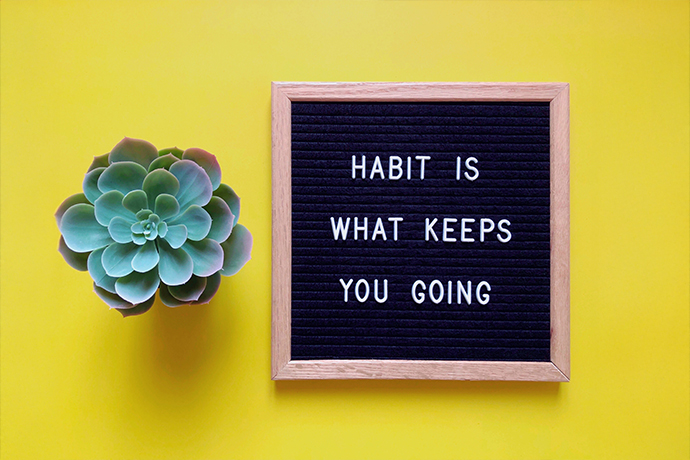 SPEAKERS
SPEAKERS
Learn how habits are built, the psychology behind behavior change, and effective strategies to train yourself for success and long-term growth.

Achieving success is not merely a matter of talent or luck; it is possible by acquiring the right habits. Through positive habits, we can navigate the chaotic nature of life without losing direction. This process offers effects that unlock personal development and inner peace. As individuals open to lifelong learning and adaptation, we can transform every new piece of knowledge and experience into habitual forms.
Building habits is possible by integrating them into our daily lives. This integration requires effectively using the cue, routine, and reward system, which forms the basis of habit formation. When behaviours become automatic in this loop, we can focus less on them and direct our energy towards new goals. Using habits as a tool for designing our lives opens up new opportunities and brings us closer to our goals than ever before.
Understanding and forming habits is a critical step for personal success. Carefully selected habits can create a domino effect in personal and professional life. Each represents a building block that helps bring you one step closer to success.
When we think about habit formation, we actually think of regularly repeating behaviours. At the heart of habits lie strengthened neural pathways and automated behaviour patterns. The brain rewards certain actions based on their appropriateness to the current situation and ensures their repetition. Thus, these actions are reinforced by neural networks and transform into regular structures in the process that is the foundation of habit formation. They become part of daily routines and are executed almost unconsciously.
At the origin of habits lie conscious selections and the internalization of these choices through repetition. Behaviours we perform similarly every day leave deep marks in our brain structure and consequently become automated. These automated processes are realized by consuming less energy in our brains over time, making us more efficient. Surprisingly, a significant portion of our habits can affect our decisions and lead us to positive or negative outcomes. What is important is consciously choosing which habits to strengthen.

Regularity, focus, and motivation are important principles of habit formation. These principles are necessary to make our behaviors sustainable. Repeating certain behaviours every day can ensure automation. Our brain learns repeated actions and reinforces them if they are rewarded in this process.
These principles should always be considered for the successful formation of healthy habits. A regular practice process helps solidify habits while focus prevents distractions. As motivational speakers frequently underline, motivation provides an internal driving force to maintain and achieve habits. Breaking down large goals into smaller, achievable steps can help maintain motivation.
When we direct our behaviours with conscious choices, a sturdier structure is established. This process begins with consciously chosen cues and is encouraged by specific rewards. Over time, this disciplined approach contributes to the permanence of our habits. Among the principles of healthy habit formation are:
While these principles form the foundation of your habits, it is essential to act with patience and determination. Each practice that continues with patience is a product of the repetition and effort that form the foundation of habit formation.
Research on how habits are processed in the brain provides valuable insights into the neurobiology of habit formation. Specifically, repeated actions lead to the strengthening of synapses in the brain. This strengthening of synapses allows the brain to recognize and reinforce certain behaviour patterns more effectively. At the same time, neurotransmitters like dopamine play a critical role in habit formation.
Dopamine is an important part of the reward system and is effective in sustaining the habit loop. The brain secretes dopamine when a positive reward is provided, creating an encouraging effect for the repetition of the behaviour. The increase in dopamine helps make the habit more permanent in the subconscious. Additionally, the basal ganglia within the brain structure function as an essential centre in making habits automatic.
Understanding these automatic responses of the brain is important to ensure healthy habit formation. Knowing the neurobiological foundations of habits allows us to consciously arrange the habits that carry importance on the path to success. This type of understanding supports individuals in making their accomplishments sustainable. Therefore, understanding neurobiological processes and concepts like neuroplasticity offers great potential in terms of personal growth and development.

Training habits for success requires discipline and patience. Taking small and measurable steps towards your goal can create significant changes over time. Resilience speakers advise that reviewing your daily routines and focusing on which healthy habits lead to success can accelerate your personal growth.
Setting daily goals helps you see your progress tangibly. Each step you take forms a foundation for larger achievements. Also, keeping your goals written down and reviewing them regularly increases your chances of reaching them.
It is important to assess the effects of your routine activities. These may include things you do at work, social life, or personal care. Developing specific habits for each can enhance your quality of life and help you reach your goals faster.
Establishing a habit can take time, so being patient is necessary. Initial failures are a natural part of the process, but continuing without giving up is critically important. As long as you are patient, positive change is inevitable, and this change becomes more visible over time.
To maintain your motivation, you can frequently create reminders for yourself. For example, the inspiring stories of successful people can help renew your motivation. These stories can strengthen your belief in your goals.
Remember, every day is an investment in your tomorrow. Making this investment correctly and consciously leaves lasting positive effects on your life.